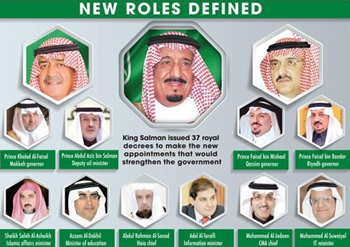
Jeddah, Jan 30: Custodian of the Two Holy Mosques King Salman announced a massive Cabinet reshuffle on Thursday, appointing Azzam Al-Dakhil, new education minister, Ahmed bin Aqeel Al-Khateeb new health minister, Adel Al-Toraifi, minister of culture and information and Abdul Lateef bin Abdul Malik Al-Asheikh new minister of municipal and rural affairs.
King Salman, who ascended the throne on Friday, reappointed Prince Khaled Al-Faisal as governor of Makkah in place of Prince Mishaal bin Abdullah and Prince Faisal bin Bandar governor of Riyadh, replacing Prince Turki bin Abdullah bin Abdul Aziz. He removed Prince Bandar bin Sultan from the position of the secretary-general for National Security Council and special envoy of the king.
Walid bin Mohammed Al-Samaani is the new justice minister, who replaces Mohammed Al-Eissa while Saleh bin Abdul Aziz Al-Asheikh was reinstated Islamic affairs minister, replacing Sulaiman Abalkhail. He merged the higher education ministry with the Ministry of Education.
Other new ministers are: Mohammed Al-Suwaiyel, minister of telecommunications and information technology; Majed bin Abdullah Al-Qassabi minister of social affairs; Abdul Rahman bin Abdul Mohsen Al-Fadli, agriculture minister; Khaled bin Abdullah Al-Araj, minister of civil service; Saad bin Khaled Al-Jabari state minister; and Mohammed bin Abdul Malik Al-Asheikh, state minister.
Foreign Minister Prince Saud Al-Faisal, Petroleum and Mineral Resources Minister Ali Al-Naimi, Finance Minister Ibrahim Al-Assaf, National Guard Minister Prince Miteb bin Abdullah, Labor Minister Adel Fakeih and Water and Electricity Minister Abdullah Al-Hussayen retained their positions.
Other Cabinet members are: Crown Prince Muqrin, deputy premier; Deputy Crown Prince Mohammed bin Naif, second deputy premier and minister of interior; Prince Mansour bin Miteb, state minister and adviser to the king; Prince Mohammed bin Salman, defense minister; and Matlab Al-Nafeesa, state minister; and Musaed Al-Aiban, state minister.
Housing Minister Shuwaish Al-Dhuwaihi, Haj Minister Bandar Hajjar, Economy and Planning Minister Muhammed Al-Jasser, Commerce and Industry Minister Tawfiq Al-Rabiah, Transport Minister Abdullah Al-Muqbil will remain in their positions. Other ministers who retained their positions were: State Minister for Shoura Affairs Mohammed bin Faisal Abusaq, and State Minister Essam bin Saad bin Saeed.
King Salman appointed Khaled bin Abdul Mohsen Al-Muhaisen as president of the National Anti-Corruption Commission (Nazaha), replacing Mohammed Al-Sharief.
Intelligence chief Prince Khaled bin Bandar was relieved and Gen. Khaled bin Ali Al-Humaidan was named the new chief. Prince Khaled bin Bandar, Prince Mishaal bin Abdullah bin Abdul Aziz bin Musaed and Prince Abdul Aziz bin Sattam have been named advisers to the king with the rank of minister.
King Salman dissolved a number of bodies such as the Higher Committee for Educational Policy, Higher Committee for Administrative Organization, Civil Service Council, the Higher Commission for King Abdulaziz City of Science and Technology, Higher Education and Universities Council, Higher Council for Education, Higher Council for Petroleum and Mineral Affairs, Supreme Economic Council, National Security Council (NSC), Supreme Council for King Abdullah City for Nuclear and Renewable Energy, Supreme Council for Islamic Affairs, and Supreme Council for the Affairs of the Handicapped.
Two new councils have been established: The Council for Political and Security Affairs and the Council for Economic and Development Affairs. The two councils will be closely linked with the Council of Ministers. The commission of experts will continue as one of the agencies of the Cabinet’s general secretariat.
The Council for Political and Security Affairs will have nine members and will be chaired by Prince Mohammed bin Naif.
The 22-member Council for Economic and Development Affairs will be chaired by Prince Mohammed bin Salman.
King Salman also reshuffled the general committee for Cabinet under the chairmanship of Musaed Al-Aiban.
Other major appointments were: Prince Abdul Aziz bin Salman, deputy minister of petroleum and minerals with the rank of minister; Prince Turki bin Saud, president of King Abdulaziz City of Science and Technology with the rank of minister; Hazim bin Mustafa Zagzoug, head of the king’s private affairs; Fahd Abdullah Al-Samari, adviser at the Royal Court; Mohammed bin Sulaiman Al-Ajaji, head of experts commission at the Cabinet; Yahya bin Abdullah Al-Samaan, assistant president of the Shoura Council; Abdul Rahman Al-Hussayen, president of the Control and Investigation Board; Mohammed bin Abdullah Al-Jadaan, president of Capital Market Authority; Sulaiman bin Abdullah Al-Hamdan, president of the General Authority of Civil Aviation replacing Prince Fahd bin Abdullah; Abdul Rahman bin Abdullah Al-Sanad, president of the Commission for the Promotion of Virtue and Prevention of Vice, replacing Abdullatif Al-Asheikh; Nabeel bin Mohammed Al-Aamoudi, president of the Saudi Ports Authority, replacing Abdul Aziz Al-Tuwaijri; and Ibrahim bin Mohammed Al-Sultan, mayor of Riyadh. Mohammed bin Abdul Kareem Al-Eissa has been removed from his position as member of the Council of Senior Islamic Scholars, one decree said.




Comments
Add new comment